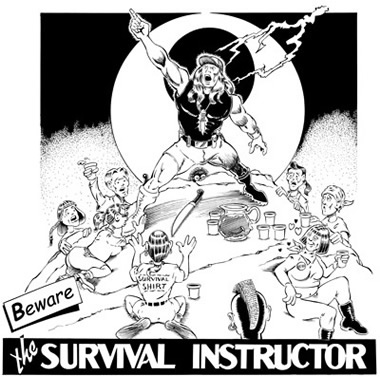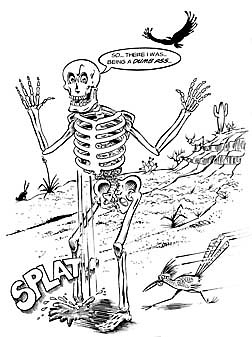Survival on TV
By Cody Lundin, 2007
I thought long and hard before writing the contents of this page as I knew it would piss some people off. In the end, my obligation as a survival instructor is to tell it as I see it, consequences be damned. In this profession, lies and the people who tell them get people killed.

Another reason I chose to put this in writing is the onslaught of people asking me what I think about the survival shows on television. Instead of spouting out another one liner, or taking time, (again) to explain the details of the situation, I’m putting my opinion down here for all to read and accept or reject as they see fit.
Here are some important points to consider, as it’s in them that I’ve based my opinion. First, realize that I don’t watch TV. I consider the lion’s share of programming to be a waste of time. Second, I have participated in a lot of television over the years both on and off camera. I know what producers want and how the game works. Third, I am intimately acquainted with the realities of survival skills based upon years of “doing it” in the field with and without students. Thus, due to my level of experience, it’s not difficult for me to figure out if “something survival” is faked or embellished on TV – and I myself have done the faking on more than one occasion.
While trapped in my hotel room in Portland, Oregon in October of 2007 as part of my book tour for When All Hell Breaks Loose, I caught parts of two major survival programs on cable television. Unfortunately for one of the hosts, the show I watched was filmed in Arizona’s Sonoran desert. I lasted 10 minutes before I changed the channel due to inaccuracies and poor desert survival priorities. For the other popular show, I lasted even less time as the programming was simply dangerous to the viewer if taken seriously. The point of this page is not to critique other people’s television shows. It is to enlighten you as to how the game works regarding programming on TV. 
First, ratings rule on television as its all about the money. If a show does not draw enough viewers to support the dollars spent in advertising during the program, the show or “pilot” (test show to see if there is enough viewer interest to make a series) will be cancelled. Now-a-days, to achieve ratings, almost anything goes. Notice how radical many nature shows have become. In the 1960s, Jacques Cousteau, host of The Undersea World of Jacques Cousteau, would never have dreamed of interfering with wildlife the way today’s animal program hosts are expected to do. (His son said as much in an interview after Steve Irwin’s death) In the past, television shows about wildlife featured the wildlife itself as the star, and the human host was all but irrelevant.
This thirst for ratings colors everything, and truth, reason, and safety go out the window when people stand to make a lot of money. It is expected that the television host and the production company will bend the rules to allow whatever network executives want to appear on TV. If the host doesn’t prostitute themselves out to the network and deliver the right product, there is a line of people more than willing to do so. I myself have been asked to do incredibly dumb things by network executives such as purposely fall into cold water and get hypothermic in the name of “drama.”
Second, big city producers and the networks themselves haven’t a clue about what real wilderness survival skills entail, and the proof is in their over-the-top yet shallow programming. Real survival can be boring, which is unacceptable for TV. How visually interesting is it to watch someone die from hypothermia, the most common way to die in a real survival situation? Also, there is no quality control for programming other than if “Joe viewer” will watch it, and needless to say, a gullible general public is just as clueless about survival skills as the networks. For some reason, if a program appears on television, people assume it to be factually correct and well researched; and at times nothing could be further from the truth.
Thirdly, depending on the show, the illusion of television and the big screen is largely that. Once the initial filming has been accomplished in the field, there is nothing that can’t be faked or tweaked to a producers liking in the edit bay back at the production company. No one is willing to risk an entire operating budget to film in Africa and not get what they came for, one way or another. Again, money is the name of the game. In my “eat a rat” video, a production company hired a film crew for specific reasons to film me. It was known before hand that the intention of the shoot was for me to kill and eat a packrat. As the film crew was being paid and on site for only a day, I had to kill the rat the day before. I placed the long dead rat under the deadfall rock minutes before we shot the scene. It appears that the deadfall trap was tripped and killed the rat…which was the point. Again, almost anything can be done in the edit room with the right footage.
If the television shows in question were simply cooking or home decorating shows, I wouldn’t care. But these shows are supposedly depicting human survival skills. If these skills are faked or embellished and made to appear as fact on the show instead of entertainment, we have entered into an entirely different realm of accountability. Touting “edit room survival skills” as real survival skills can kill real people in real survival scenarios. In fairness to the networks, anyone who bases their preparedness program on a television show should probably leave the gene pool anyway. Does watching a football game on TV mean you know how to throw a football? In like fashion, watching a program or reading a book on survival doesn’t mean you know how to deal with a survival scenario.
If you love your survival shows and pick up a cool survival tidbit or two, fine. But please have the common sense and wisdom to realize the show for what it is -- entertainment.
Stay safe, Cody



